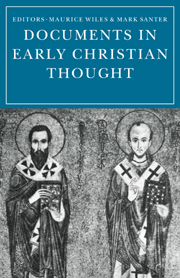7 - CHURCH
Published online by Cambridge University Press: 17 August 2009
Summary
The lines on which the Latin doctrines of the Church and sacraments developed were largely determined by controversy, much of it centered in North Africa. In the first two passages of this section we find two African bishops, Cyprian in the middle of the third century and Augustine early in the fifth, grappling with the questions of the identity and limits of the Catholic Church.
The election of Cornelius as bishop of Rome in a.d. 251 was disputed, and the impeccably orthodox but rigorist Novatian was consecrated as a rival bishop. For Cyprian the issue was clear-cut. The orthodoxy of Novatian's teaching was irrelevant. He had broken with the one and only Church and therefore had no part in her. In consequence, Novatianist baptism was worthless, and persons baptized as Novatianists who wished to join the Catholic Church must be rebaptized.
The Roman Church took the opposite view, holding that those who had received schismatical, as opposed to heretical, baptism did not need to be rebaptized if they became reconciled to the Catholic Church. When the Donatist schism broke out in North Africa in the third century, the Donatist party held to Cyprian's view of the matter, while the Catholic party adopted the Roman practice. Augustine's work On Baptism is directed against the Donatists. He could not hope to convince his opponents unless he could enlist the authority of Cyprian on his side.
- Type
- Chapter
- Information
- Documents in Early Christian Thought , pp. 159 - 171Publisher: Cambridge University PressPrint publication year: 1975



